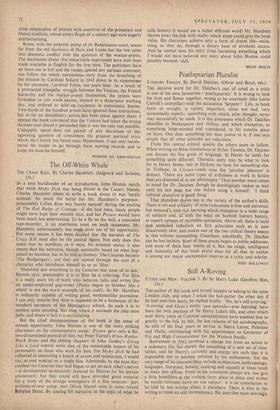Postlapsarian Pluralist
LITERARY ESSAYS. By David Daiches. (Oliver and Boyd, Ms.) THE decisive word for Dr. Daiches's cast of mind as a critic is one of his own favourites—`postlapsarian.' It is wrong to look for fruit and flower together, wrong to be overready (like Lewis Carroll's caterpillar) with the accusation 'Serpent!' Life, in book form or straight, is varied, imperfect, often not bad, very occasionally superb : something with which, after .thought, terms may successfully be made. It is this awareness which Dr. Daiches identifies in Shakespeare and Milton, and which transpires, as something large-minded and considered, in his notable piece on Scott. One does something less than justice to it, if one says simply that all other attitudes are ridiculous. From this central critical quality the others seem to follow. When writing on Bible translations or Dylan Thomas, Dr. Daiches can discuss the fine grain of language. In Hardy he looks for something quite different. Thematic unity may be what to look for in Henry James, but in Dickens we look for something else. In Trollope, in Ulysses--each time the 'peculiar pleasure' is distinct. 'There are more types of artfulness at work in fiction than are dreamed of in our philosophy.' Thus another word comes to mind for Dr. Daiches, though he disobligingly makes us wait until his last page but one before using it himself: 'I think cultural pluralism a good thing.'
That pluralism shows too in the variety of the author's skills. There is wit and urbanity of style ('education is free and universal, but watered'); and rich learning which transpires in a wide range of subjects and, as with the essay on Scottish literary history, in superb aptness of recondite quotation. Above all, there is lucid and sustained reflection on first principles such as is now disastrously rare; and makes one of the two critical theory essays in this volume outstanding. Elsewhere, admittedly, Dr. Daiches can be less incisive. Most of these pieces began as public addresses, and some of them bear marks of it. But the range, intelligence and humanity of this book prove once for all that its author is among our major unexpended reserves as a critic and scholar.


































 Previous page
Previous page